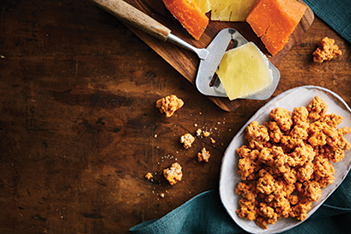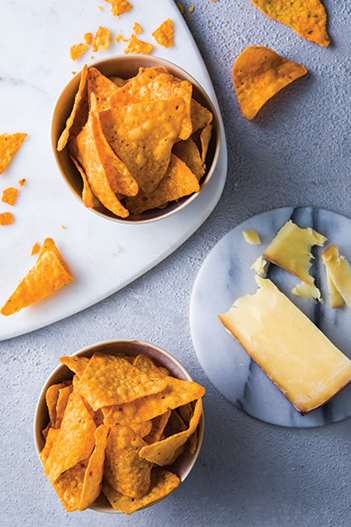 |
|||

|  |

|
|

Kerry offers sustainable nutrition, trending flavors to feed the world
Editor’s note: Welcome to Ingredient Innovation, CMN’s new segment exploring recent innovations and trends in the dairy ingredients sector. For this segment, we will profile a leader in the ingredients industry as well as share updates on mergers and acquisitions and new offerings for cheese and dairy in ingredients — where flavor begins.
|
Photo courtesy of Kerry |
| SAVORY SNACKS — One area of steady growth and innovation has been the explosion of consumer demand for tasty, nutritious snacks. Kerry is leveraging dairy into new categories — like a shelf-stable filled cheese snack — or providing cheeses with unique functionality. |
 |
| Photo courtesy of Kerry |
| TASTE + NUTRITION — For decades, Kerry has been partnering with customers to enhance the nutritional profile of their products without sacrificing taste. “We know dairy is inherently healthy, so we want to emphasize our nutrition and value proposition into dairy,” says Ellen Morgan, Kerry’s global senior director of research, development and applications for dairy. |
By Alyssa Mitchell
BELOIT, Wis. — From its beginnings 50 years ago as a small dairy company in Ireland to the multinational solutions provider it is today, Kerry continues to offer customers cutting-edge flavor and nutrition expertise rooted in a strong dairy heritage with a focus on sustainability.
With North American headquarters in Beloit, Wisconsin, Kerry is committed to helping delight and nourish consumers everywhere, company officials say, noting the last five decades have seen extraordinary change in the way people live their lives.
“Kerry’s experience means we rise to this challenge: developing solutions that meet evolving tastes and provide sustainable nutrition for generations to come,” the company says.
Innovative solutions often are the result of cross-functional collaboration, Kerry says, noting its teams are here to partner on the creation of healthier, tastier and more sustainable products, from collecting consumer insights and applying food and sensory science to solving manufacturing and regulatory challenges. And with research centers and manufacturing locations around the world, Kerry has the ability to offer local solutions with a global point of view.
Its roots in dairy also underpin a nutrition-focused approach to bring consumers products that meet the demand for clean labels and sustainable offerings that maintain great taste, notes Ellen Morgan, global senior director of research, development and applications for dairy, Kerry.
For decades, Kerry has been partnering with customers to enhance the nutritional profile of their products without sacrificing taste, adds Christin Kohloff, vice president, research, development and applications for food, Kerry.
“We work to elevate nutrition and use tools to reduce fat, sugar and salt, but we also have tools for proactive nutrition,” Kohloff says.
“We know dairy is inherently healthy, so we want to emphasize our nutrition and value proposition into dairy,” Morgan adds. “Our strength is in innovation and our agility and ability to stay ahead of the curve.”
• Snacking innovations
One area of steady growth and innovation has been the explosion of consumer demand for tasty, nutritious snacks. Morgan says Kerry is finding a way to leverage dairy into new categories — like a shelf-stable filled cheese snack — or providing cheeses with unique functionality, like bake stability or emulsion stability.
“We’re bringing on-trend flavors into dairy and using our marketing insights to address key taste trends,” she says.
A recent study from Kerry found that consumers across the world associate cheese flavors with indulgence, comfort and freshness, with significant variation in different regions. The company says understanding these emotions, in combination with local taste preferences, presents a significant opportunity for snack producers to innovate and meet growing consumer demand for new flavors and formats.
Kerry surveyed 8,790 consumers across 16 countries in Europe, Latin America, North America, Asia Pacific, the Middle East and Africa to learn more about snacking behaviors as they related to cheese-flavored savory snacks, while also studying new product launch activity. The survey found that consumers have a deeply positive perception of cheese flavors in savory snacks, with 62% stating that cheese flavors make savory snacks more exciting. Cheese-flavored snacks also outpaced the overall savory snack category in new product launches.
While 77% of consumers globally say taste is the No. 1 reason they love cheese, preferences vary across different markets and geographies, the study found. Indulgence is a big driver in Europe, while U.S., United Kingdom (UK) and South African consumers turn to cheese for comfort.
The research also explored top flavors based on snack type, with Cheddar reigning supreme around the world and cited as the most appealing cheese profile across potato chips, popcorn and cheese puffs.
Meanwhile, key acquisitions, such as Kerry’s acquisition of the business-to-business powdered cheese business and related assets of The Kraft Heinz Co. in August, have helped to enhance Kerry’s scale, manufacturing capability and customer base in the snacking category.
“With this acquisition, we’re expanding our production capabilities and helping our customers deliver a greater value and variety of cheese snacks,” Morgan says. “This partnership really complements our existing dairy taste and powdered cheese portfolio — and with new facilities, we can increase production and access to new customers in the snacking arena.”
• Plant-based demand
The growing demand for plant-based alternatives also is an area of focus at Kerry. Earlier this year, the company surveyed more than 1,500 consumers across four countries — the United States, UK, Australia and Brazil — to uncover sensory expectations around plant-based burgers and cheese alternative slices. The research found that flexitarians, the key consumer group driving the growth of plant-based, are more critical of products versus vegan and vegetarian consumers.
The research found that 63% of U.S. consumers started eating plant-based products because they believe plant-based is “better for the planet.”
However, while sustainability is a top driver, consumers are unwilling to compromise on taste and seek products that are as close to the taste experience of animal products as possible, Kerry found.
“Our strength is around innovation and agility. Flexitarian consumers are looking to add more plant-based but are still consuming dairy, so it’s critical that the plant-based products deliver the same experience,” Morgan says. “So we’ve translated our dairy processing expertise into that plant-based space to make products that really taste and perform like dairy cheese.
“Taste and performance is key,” she adds. “Plant-based dairy no longer gets a free pass on taste and nutrition and ingredient labels. A lot of our customers struggle with taste and texture of plant-based dairy products, so we’ve developed a robust portfolio of solutions that are designed to re-create dairy alternatives that perform and taste like real cheese.”
Some of those solutions include texturants — for example, for creaminess, mouthfeel or stretch, Morgan notes.
“Then on the taste side, we want to develop an authentic taste profile,” she says, noting this is underpinned by leveraging the company’s unique set of assets like marketing tools and research to help with speed to market and commercialization.
“We offer a one-stop shop to get products to market faster,” she says.
• Sustainable solutions
Kohloff says while dairy is a notorious contributor to high emissions, Kerry is working to develop new solutions with its customers, including plant-based snacks, which have experienced significant growth and are expected to continue to grow.
“Sustainable nutrition is our ability to create nutrition solutions that help maintain good health while protecting people and the planet,” she says. “We have a target to reduce scope 3 carbon emissions (indirect emissions that occur in the value chain) by 2030, like a lot of our customers. In order to meet this goal, we have to address dairy.”
Morgan adds Kerry is creating a path forward in low-carbon dairy in America, based on some of the programs it has in Europe, as it looks at ways to incorporate sustainable dairy into U.S. products and markets.
In Ireland, the company has launched a dairy sustainability program called Evolve that supports the acceleration of science-backed sustainability actions and best practices across farms in Ireland — something it hopes it could bring to the United States.
“I love working for a company that has sustainability at the core of its values — we walk the walk and not just talk the talk,” Kohloff says. “We’re in an industry-leading dairy position, and we’re looking to incorporate sustainable dairy into North America.”
Morgan adds that Kerry’s growth story is really about evolution.
“We’re becoming a world leader in creating a world of sustainable nutrition today. The other piece is our history has always been about adapting and innovating and staying ahead of the curve — integrating solutions of taste, nutrition and sustainability with dairy,” she says.
CMN
| CMN article search |
|
|
© 2025 Cheese Market News • Quarne Publishing, LLC • Legal Information • Online Privacy Policy • Terms and Conditions
Cheese Market News • Business/Advertising Office: P.O. Box 628254 • Middleton, WI 53562 • 608/831-6002
Cheese Market News • Editorial Office: 5315 Wall Street, Suite 100 • Madison, WI 53718 • 608/288-9090
